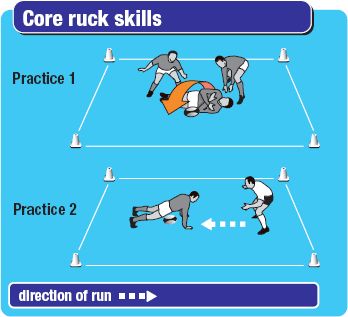
The pre-season was traditionally considered a time for rugby players to make big improvements in their fitness. The pre-season for amateur players is usually 12 to 14 weeks, while professional players might take a longer off-season block.
In addition to gaining muscle mass and strength, rugby players also need to focus on speed and explosiveness. Rugby has seen a lot of changes over the years. Therefore, players must be able to handle the physical demands of the sport. For instance, players need to be able to sprint to change directions. They should also be able execute various physical skills, such as collisions and multi-directional running.
This is something players must learn during the preseason. However, the most important physical ability to focus on is speed. This is because rugby players have to be able move quickly and change directions. This technique allows rugby players to quickly and efficiently gain a foothold on the field.
Pre-season can also be a good time to put emphasis on hypertrophy. Hypertrophy is the ability to build more muscle mass. This helps to prevent injuries. This will allow them to perform at their best every game.

Pre-season strength training is essential for rugby players. Strength training typically involves lifting weights or engaging in explosive exercises like plyometrics. These activities can help you develop explosive force and more power.
FAQ
What happens if someone is trying extreme sports but falls off a mountain?
Extreme sports can cause you to break bones and even your neck if you fall from a cliff.
This would be a serious injury. Falls from a height higher than 30 meters (100 ft) you can die.
What is the most hazardous sport in extreme sports?
It is snowboarding because you must balance on top of a board while falling off a mountain at high speeds. Falls you do it wrong, you can die.
Who takes part in extreme sports?
Extreme sports is open to everyone who wishes to try something new. Either you want to learn about extreme sports or compete against others, both are possible.
There are many different activities that you could choose from. Some involve jumping off a rock. Others involve riding a bicycle for long distances. Still, others involve skiing or snowboarding.
Extreme sports require special skills. To skydive, you must first learn the ropes before you can jump from an airplane. Parachuting also needs practice.
Extreme sports are very popular with young people. These sports can be enjoyed as a way of enjoying nature. They are also popular among athletes who train hard in order to improve their performance.
What is extreme in a sport?
Sports have been around for thousands of years. They've evolved from being purely athletic competitions to becoming full-fledged entertainments. Some sports have become part and parcel of our culture.
Some sports are considered extreme because of their high level of competition. For example, professional basketball players play against each other almost daily for many hours. Other sports are considered extreme due to the need for special equipment. Snowboarding involves riding down hills with two wheels attached to your bottom.
Because of their rules, other sports can be considered extreme. For example, American football is played differently in soccer.
Extreme sports require that their participants perform extraordinary feats of athleticism. Gymnastics can be difficult, as athletes must balance on many objects while keeping their balance.
Is extreme sport dangerous?
Extreme sports can be dangerous as they pose a risk of injury or death. However, many people have died from drowning or other causes.
Even when you do something quite safe, such as riding a bike or rollerblading - injuries can still occur.
Extreme sports can be dangerous for those who sustain injuries.
The National Football League forbids players from participating in extreme sports like skateboarding because of the high risk involved.
You should be careful about what you do and how others react to your extreme sport endeavors.
How does an extrem sport differ from regular sporting activities?
An extreme sport involves physical exertion and/or skill combined with a challenge.
You may need to use unique clothing, helmets, and goggles.
Extreme sports are not like traditional sports that require training. They test your ability to perform under stress.
They are generally outdoors and have no protection in case something goes wrong.
Some extreme sports can be considered illegal while others may be legal. It depends on where you live and what kind of activity you're involved in.
You need to verify the local laws if you plan on doing extreme sports.
Statistics
- Overall participation has grown by more than 60% since 1998 - from 5.9 million in 1998 to 9.6 million in 2004 Artificial Wall Climbing. (momsteam.com)
- Approximately 50% of all wakeboarders have been participating in the sport for 1-3 years. (momsteam.com)
- According to the United States Parachuting Association, about 21 people die yearly from skydiving. (livehealthy.chron.com)
- Since 1998, overall participation has grown nearly 25% - from 5.2 million in 1998 to 6.5 million in 2004. (momsteam.com)
- Nearly 40% of all mountain bikers have at least graduated from college. (momsteam.com)
External Links
How To
How do you learn parkour skills?
Parkour is an open-ended running style that involves people running through obstacles like trees, walls, fences, fences, and buildings. It's one of the most popular sports in the world, with millions of participants around the globe. Parkour can be done in many ways, including freestyle, wall climbing and obstacle courses, urban exploration, rescue, freerunning and urban combat.
Fitness is any activity that increases your physical fitness and overall health. This could include going to the gym, exercising cardio, or simply walking. Parkour can be considered a sport, as it requires parkour athletes to use their strength, speed and coordination.
Here are some tips for beginners who want to start training parkour:
-
Places that can cause injury or stairs should be avoided. Avoid hills, choose flat ground and climb trees if possible.
-
Shoes made from leather, rubber, or leather should be worn. You don't have to choose the right shoe for you. The right shoes can make a parkour session or not.
-
You can bring water bottles or snacks with you to keep hydrated during practice sessions.
-
Before starting a parkour session, warm up first. This is warming up your muscles before you start the parkour session. You can start slow and increase the intensity gradually until your muscles are fully prepared.
-
Jumping shouldn't be a reliance on your legs and arms. Instead, you should focus on your core and back muscles to jump over obstacles.
-
You shouldn't be pushing yourself too hard. Take breaks every now and again. This will help you recover from your workout without getting hurt.
-
While practicing parkour, listen to music. Music helps you relax and concentrate better.
-
Stretch your muscles to prevent any injuries after each session.
-
Always clean up after yourself, especially if you're practicing in public spaces. This way, you won't risk hurting someone else.
-
Keep track of your progress by noting down your performance in a journal. You'll be able to remember your strengths as well as your weaknesses.
-
Remember, parkour is intended to be fun. You should enjoy the process, and not let fear of falling hold your back. Do not be afraid to fall. Get up and keep going.
-
Everyday, you learn new tricks and techniques.
-
Be sure to eat healthy meals. A diet high in protein will help you gain muscle mass faster.
-
You should find a mentor. Mentors can teach you certain moves and offer advice on how to improve your skills.
-
Ask questions! The people who love to share their knowledge with others are always happy to answer questions.
-
Practice makes perfect. Train whenever you can.
-
Have fun
-
Last but not least, be safe